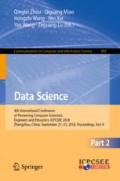Abstract
With the rise of large-scale online open courses, the era of MOOC has come and it has created opportunities and challenges for higher education at home and abroad. Many colleges and universities use the combination of MOOC and classroom teaching. Through online and offline synchronization courses, the mixed teaching based on MOOC is formed. A series of learning behavior data has been generated when students participate in the online MOOC system. The resulting data facilitates learning analysis to improve teaching quality and improve learning behavior. This paper collects the learning behavior data from MOOC, uses the Pearson coefficient to select the learning behavior characteristics related to the learning effect, and establishes a learning performance classification model based on the Support Vector Machine (SVM), and predicts the learning performance according to the learning behavior data. The accuracy of the performance forecast was 95.26%.
Access this chapter
Tax calculation will be finalised at checkout
Purchases are for personal use only
Notes
- 1.
Zhengzhou University Education Teaching Reform Research and Practice Project.
References
Li, S.: Research and practice of blending teaching model based on MOOCs in programming classes–a case study of “C ++ programming”. Softw. Guide 16(1), 189–191 (2017)
Fu, J., Wu, S., Zhao, Y.: Design and practice of blended teaching mode based on MOOCs. Commun. Vocat. Educ. 15, 43–45 (2016)
Yuan, M.: Design and practice of mixed teaching course based on MOOCs–a case study of the course “computer application foundation”. Educ. Forum 28, 161–162 (2016)
He, K.: Observe the new development of educational technology theory from blending learning. China Educ. Technol. 4, 10–15 (2004)
Mu, L., Qian, X.: Mixed teaching practice and thinking based on MOOCs. Comput. Educ. 9, 82–86 (2017)
Zheng, X., Yang, J.: The learning analytics in higher education: progress, chal-lenges and future directions. China Educ. Technol. 2, 1–7 (2016)
Arnold, K.E., Pistilli, M.D.: Course signals at Purdue: using learning analytics to increase student success. In: International Conference on Learning Analytics and Knowledge, pp. 267–270. ACM (2012)
Lockyer, L., Heathcote, E., Dawson, S.: Informing pedagogical action aligning learning analytics with learning design. Am. Behav. Sci. 57(10), 1439–1459 (2013)
Greller, W., Drachsler, H.: Translating learning into numbers: a generic framework for learning analytics (Report). Educ. Technol. Soc. 15(3), 42–57 (2012)
Dietzuhler, B., Hurn, J.E.: Using learning analytics to predict (and improve) student success: a faculty perspective. J. Interact. Online Learn. 12(1), 17–26 (2013)
Zhang, Yu., Li, Y.: Learning analytics and education assessment based on big data generated by MOOCs. Tsinghua J. Educ. 34(4), 22–26 (2013)
Li, M., Xu, S., Sun, M.: The analysis of learning behaviors in MOOCs–a case study of “circuit principle” course. Open Educ. Res. 21(2), 63–69 (2015)
Jiang, Z., Zhang, Y., Li, X.: Learning behavior analysis and prediction based on MOOC data. J. Comput. Res. Dev. 52(3), 614–628 (2015)
Zhao, Z., Li, Z., Zhou, D., Zhong, S.: Research on recommendation system and analyze learning behavior in intelligent learning space. Mod. Educ. Technol. 26(1), 100–106 (2016)
Sun, L., Zhang, K., Ding, B.: Research and realization of subdivision prediction of network education based on data mining–a case study of undergraduate adult degree English test. Distance Educ. China 12, 22–29 (2016)
Zhang, C., Li, L.: MOOC based learning support services in blended teaching. Distance Educ. China 2, 66–71 (2017)
Li, X., Liang, Z., Zhao, N.: The influence of online learning behavior based on mixed learning performance. Mod. Educ. Technol. 2, 79–85 (2017)
Ding, M., Wu, M., You, J., et al.: Research on teaching intervention based on academic performance prediction. Distance Educ. China 4, 50–56 (2017)
Jing, X., Tang, J.: Guess you like: course recommendation in MOOCs. In: The International Conference, pp. 783–789 (2017)
Cortes, C., Vapnik, V.: Support-vector networks. Mach. Learn. 20(3), 273–297 (1995)
Author information
Authors and Affiliations
Corresponding author
Editor information
Editors and Affiliations
Rights and permissions
Copyright information
© 2018 Springer Nature Singapore Pte Ltd.
About this paper
Cite this paper
Sun, S., Qian, X., Mu, L., Zan, H., Zhang, Q. (2018). Performance Prediction Based on Analysis of Learning Behavior. In: Zhou, Q., Miao, Q., Wang, H., Xie, W., Wang, Y., Lu, Z. (eds) Data Science. ICPCSEE 2018. Communications in Computer and Information Science, vol 902. Springer, Singapore. https://doi.org/10.1007/978-981-13-2206-8_54
Download citation
DOI: https://doi.org/10.1007/978-981-13-2206-8_54
Published:
Publisher Name: Springer, Singapore
Print ISBN: 978-981-13-2205-1
Online ISBN: 978-981-13-2206-8
eBook Packages: Computer ScienceComputer Science (R0)

